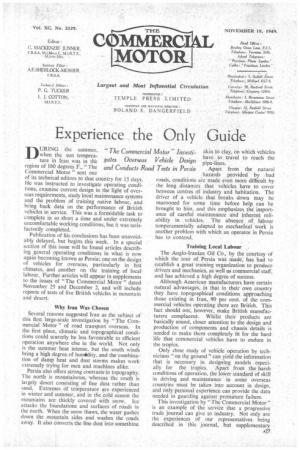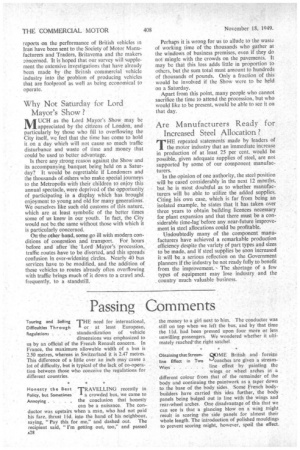Experience the Only Guide •
Page 29

Page 30

If you've noticed an error in this article please click here to report it so we can fix it.
"The Commercial gates Overseas and Conducts Road
DURING the summer, when the sun temperature in Iran was in the region of 160 degrees F., "The Commercial Motor" sent one of its technical editors to that country for 15 days. 1-fe was instructed to investigate operating conditions, examine current design in the light of overseas requirements, study local maintenance systems and the problem of training native labour, and bring back data on the performance of British vehicles in service. This was a formidable task to complete in so short a time and under extremely uncomfortable working conditions, but it was satisfactorily completed.
Publication of his conclusions has been unavoidably delayed, but begins this week. In a special section of this issue will be found articles describing general operating conditions in what is now again becoming known as Persia; one on the design of vehicles for overseas, particularly in hot climates, and another on the training of local labour. Further articles will appear in supplements to the issues of "The Commercial Motor" dated November 25 and December 2, and will include reports of tests of five British vehicles in mountain and desert.
Why Iran Was Chosen Several reasons suggested Iran as the subject of this first large-scale investigation by " The Commercial Motor" of road transport overseas. In the first place, climatic and topographical conditions could scarcely, be less favourable to efficient operation anywhere else in the world. Not only is the summer heat intense, but the south winds bring a high degree of humidity, and the combination of damp heat and dust storms makes work extremely trying for men and machines alike.
Persia also offers strong contrasts-in topography. The north is mountainous, whereas the south is largely desert consisting of fine dust rather than sand. Extremes of temperature are experienced in winter and summer, and in the cold season the mountains are thickly covered with snow. Ice attacks the foundations and surfaces of road in the north. When the snow thaws, the water gushes down the mountain sides and washes the roads away. It also converts the fine dust into somethine Motor Investiakin to clay, on which vehicles have to travel to reach the Vehicle Design pipe-lines. Tests in Persia Apart from the natural hazards provided by bad roads, conditions are made even more difficult by the long distances that vehicles have to cover between centres of industry and habitation. The driver of a vehicle that breaks down may be marooned for some time before help can be brought to him, and this emphasizes. the importance of careful maintenance and inherent reliability in vehicles. The absence of. labour temperamentally adapted to mechanical work is another problem with which an operator in Persia has to contend.
Training Local Labour The Anglo-Iranian Oil Co., by the courtesy of which the tour of Persia was made, has had to establish a great training organization to produce drivers and mechanics, as well as commercial staff, and has achieved a high degree of success.
Although American manufacturers have certain natural advantages, in that in their own country they have topographical conditions approaching those existing in Iran, 90 per cent, of the commercial vehicles operating there are British. This fact should not, however, make British manufacturers complacent. Whilst their products are basically sound, closer attention to the design and production of components and chassis details is needed to make them completely fit for the hard life that commercial vehicles have to endure in the tropics.
Only close study of vehicle operation by technicians "on the ground" can yield the information that is necessary in designing models especially for the tropics. Apart from the harsh conditions of operation, the lower standard of skill in driving and maintenance in some overseas countries must be taken into account in design, and Only personal experience can provide the data needed in guarding against premature failure.
This investigation by "The Commercial Motor" is an example of the .service that a progressive trade journal can give to industry. Not only arc the experiences of our representatives being described in this journal, but supplementary reports on the performance of British vehicles in Iran have been sent to the Society of Motor Manufacturers and Traders, Britavema and the makers concerned. It is hoped that our survey will supplement the extensive investigations that have already been made by the British commercial vehicle industry into the problem of producing vehicles that are foolproof as well as being economical to operate.
Why Not Saturday for Lord Mayor's Show ?
MUCH as the Lord Mayor's Show may be appreciated by the citizens of London, and particularly by those who fill to overflowing the City itself, we feel that the time has come to hold it on a day which will not cause so much traffic disturbance and waste of time and money that could be used to better advantage. Is there any strong reason against the Show and its accompanying banquet being held on a Saturday? It would be regrettable if Londoners and the thousands of-others who make special journeys to the Metropolis with their children to enjoy this annual spectacle, were deprived of the opportunity of participating in a display which has brought enjoyment to young and old for many generations. We ourselves like such old customs of this nature, which are at least symbolic of the better times same of us knew in our youth. In fact, the City would not be the same without those with which it is particularly concerned. On the other hand, some go ill with modern conditions of congestion and transport. For hours before arid after the -Lord Mayor's procession„ traffic routes have to be diverted, and this spreads confusion in ever-widening circles. Nearly 40 bus services have to be modified, and the addition of these vehicles to routes already often overflowing with traffic brings much of it down to a crawl and, frequently, to a standstill. Perhaps it is wrong for us to allude to the waste of working time of the thousands who gather at the windows of business premises, even if they do not mingle with the crowds on the pavements. It may be that this loss adds little in proportion to others, but the sum total must amount to hundreds of thousands of pounds. Only a fraction of this would be involved if the Show were to be held on a Saturday. Apart from this point, many people who cannot sacrifice the time to attend the procession, but who would like to be present, would be able to see it on that day.
Are Manufacturers Ready for Increased Steel Allocation ?
THE repeated statements made by leaders of the motor industry that an immediate increase in production of at least 25 per cent. would be possible, given adequate supplies of steel, are not supported by some of our component manufacturers. In the opinion of one authority, the steel position will be eased considerably in the next 12 months, but he is most doubtful as to whether manufacturers will be able to utilize the added supplies. Citing his own case, which is far from being an isolated example, he states that it has taken over three years to obtain building licences necessary for plant expansion and that there must be a considerable time-lag before any near-future improvement in steel allocations could be profitable. Undoubtedly many of the component manufacturers have achieved a remarkable production efficiency despite the variety of part types and sizes to be made, and if steel supplies be soon increased it will be a serious reflection on the Government planners if the industry be not ready fully to benefit from the improvement. The shortage of a few types of equipment may lose industry and the country much valuable business.




























































































